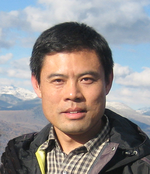 Wang Kai, urban planner, deputy president of China Academy of Urban Planning and Design (CAUPD). Membership of Urban Planning Society of China (UPSC).
Wang Kai, urban planner, deputy president of China Academy of Urban Planning and Design (CAUPD). Membership of Urban Planning Society of China (UPSC).
He was educated in Tongji University (urban planning degree 1986), Shanghai, Tsinghua University (MSc 1997 and Doctorate Degree 2006 ), Beijing. He is registered as urban planner in China. He was an academic visitor at the School of City and Regional Planning, Cardiff University.
Since 1986, he has been working on many different projects on planning. He is one of the project leaders for comprehensive plans of Beijing, Shenyang and Taiyuan, strategic development plans of Hangzhou, Xiamen and Ningbo, regional plans of Bohai Bay Area and Jiangxi Province, China Urban System Plan. He has also been involved in economic and development districts in Guangzhou and Shenzhen. He has a lot of experience in city strategy research, comprehensive plan and regional plan.
He has also been involved in research of urbanization, city development policy, regional planning. The main research projects include: Evaluation and Prediction of the Speed and Quality of Chinese Urbanization. (The Ministry of Science and Technology, The National Major Supporting Project of the “Eleventh Five Year Plan” Period); Studies on the Planning and Construction of the Chinese Mega-City Region (Chinese Academy of Engineering);Strategies and Countermeasures of Urban Underground Space Development and Utilization in 21st Century China (Chinese Academy of Engineering).
He is actively joining different kinds of academic activities. He was the chief of Youth Working Committee of Urban Planning Society of China, and now he is the general secretary of the Regional Planning and City Economy Committee of the Urban Planning Society of China. In many projects, he has invited international experts to join, i.e. Australian experts involved in Hangzhou Strategic Plan, Ningbo and Xiamen involved British experts.
From 2005 he has been deputy editor of the magazine Urban Planning International (UPI). He has published a lot of academic articles concerning urban development history, urbanization policy, regional planning, city development strategy and so on.
He became a member of ISOCARP in 2006. He has participated in congresses and presented papers.